These days, young parents have tons of information about raising kids. There are books, websites, and experts offering advice on every little thing. They can even get consultations from specialists whenever they need. But our own parents didn’t have all that. They raised us based on what they knew and what they learned from their own parents. So sometimes, the way we were brought up can seem really different from what we’re told is best now.
1. Early marriage and parenthood go without saying.
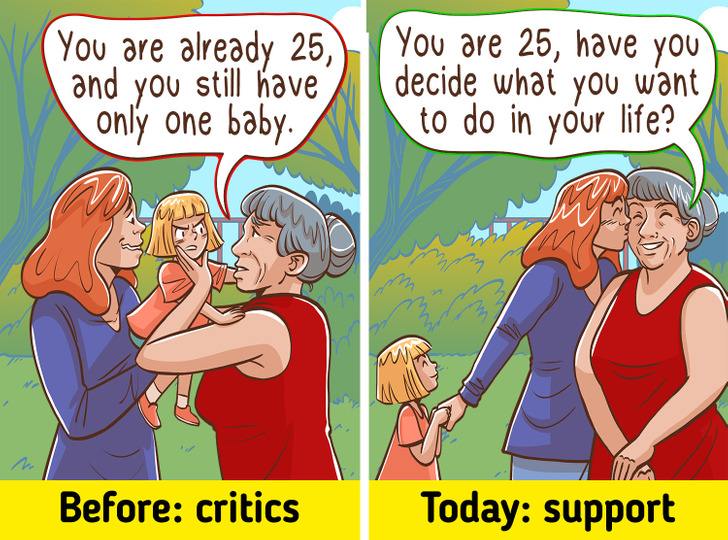
In earlier generations, there was often pressure on young adults to marry and start a family at a relatively young age, and to have more than one child a couple of years after the start of the family. Today, there is more emphasis on personal and career development before settling down. And moreover some researches show that early marriage can lead to some family problems, like dissatisfaction with married life, experience of having lots of responsibility, lack of independence in family life.
2. A college education is an indicator of your status.

«You can’t find a good job without going to college!» Many people must have heard this when they were teenagers. And lots of us believed this, but now don’t even know where our college diploma is. More than 41% of people that finished college have jobs that don’t require this kind of education. Today, employers are more interested in the practical skills of their employees rather than their qualifications.
When you finish school, it may be wise to take a gap year to understand what you really want to do and decide if you actually need a college education.
3. Classes are good for kids’ development — the more, the better!

A very tight schedule can exhaust children, which is obviously not good at all.
Famous American teacher Douglas Haddad recommends that parents slow down and give their children time to discover their own talents, and then decide if they need additional forms of education.
4. Being plump is healthy.
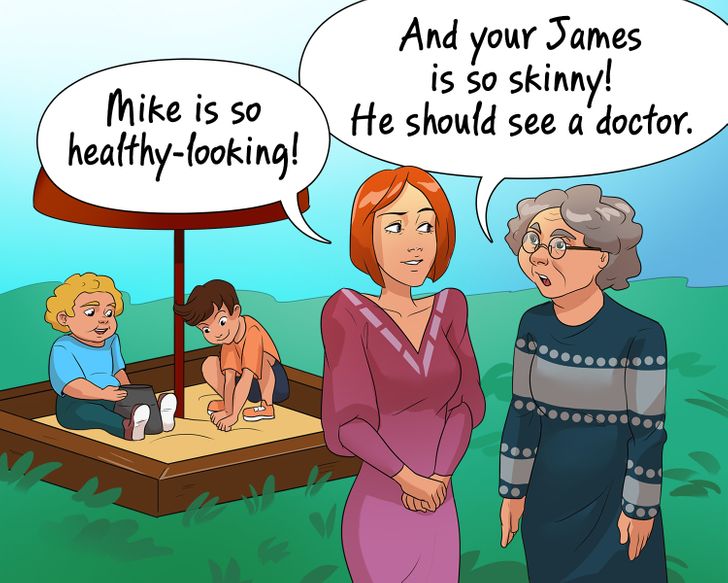
Children that always finished their meals were praised, and being plump was believed to be healthy. But bad eating habits formed in childhood often result in weight problems and eating disorders.
5. Money can’t buy happiness.

We wish this were true, but life says otherwise: money can make you happier, no matter what other people say.
Parents should teach their children the basics of budgeting. This will help kids form the right habits in money management and reach financial success in their adult lives.
6. Not standing out from the crowd means being good.
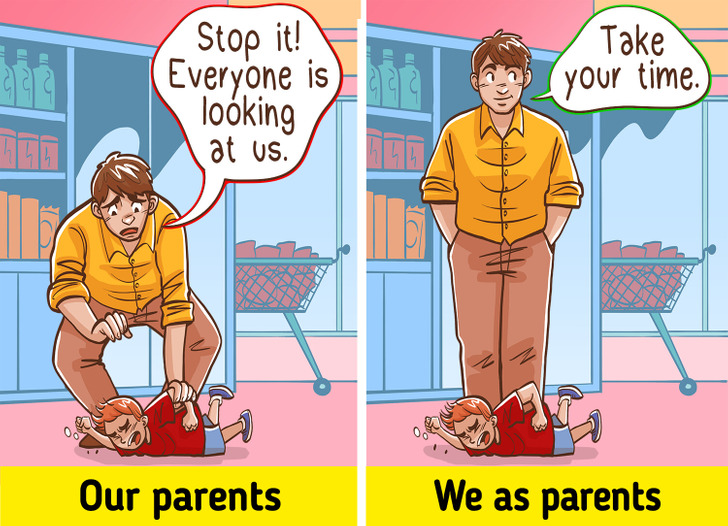
Traditional parenting often enforced strict dress codes and grooming expectations, particularly regarding modesty and conformity to societal norms. This might puzzle us today as modern parenting encourages children to express themselves through their clothing, appearance and let them express their emotions fully.
7. Older children are responsible for younger ones.
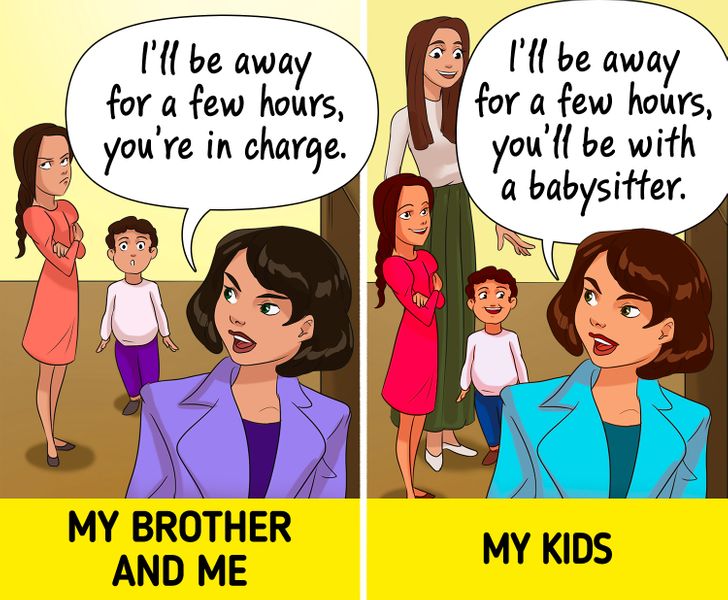
Very often, older children had to spend a lot of time taking care of younger ones. Parents had to work a lot and there was no other choice. But older kids had to sacrifice their time with friends and hobbies for the needs of their younger siblings.
Psychologists say that sometimes when kids have to perform the duties of parents, it may lead to psychological problems: they might not want to have their own children.
8. Women are housewives and men are breadwinners.

In recent decades, gender roles are not as important anymore. Women today can build successful careers and men can go on paternity leave and manage things around the house.
9. There’s nothing more shameful for a woman than having children without a husband.
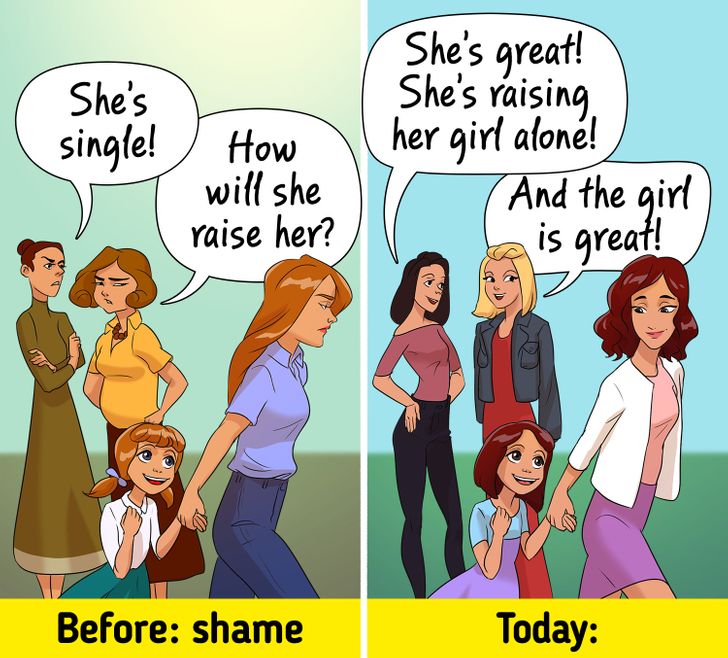
Wrong, again. Today, there’s nothing surprising about single mothers and they’re not frowned upon as they were 30 years ago. Very often, having a child without a husband is an informed decision made by a woman. More than that, in the past 30 years, the number of single fathers has increased 1.5 times.
10. Storks deliver babies.
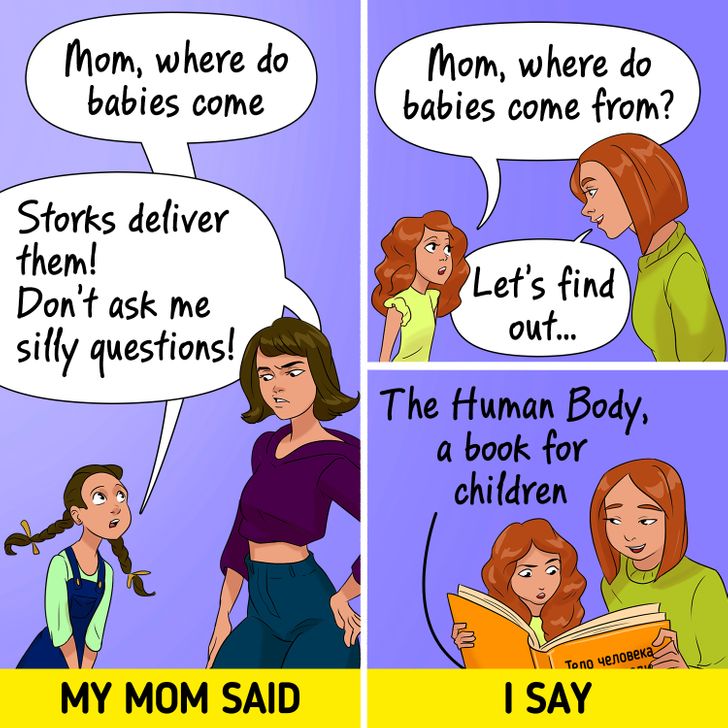
Some topics were never discussed — like when kids asked where babies came from, parents often said that they were delivered by a stork. Because of this, young people would often get into their first relationship without any knowledge of their bodies. They only based things off of the advice they received from their friends and bits of information from books and films. All these experiences could lead to bad consequences, including problems with both physical and mental health.
11. Children should be seen and not heard.

In the past, children were often expected to remain quiet and obedient in the presence of adults. Modern parenting emphasizes the importance of children expressing themselves and their opinions, because self-expression is a vital component of a young individual’s growth. The development of self-esteem and confidence in children is frequently nurtured by their capacity to express their feelings with clarity and authenticity.
Every parent has their own way of raising children. Just like how every family has its own special traditions, parents have rules they think are best for their kids. Sometimes, famous people, like celebrities, also share their ideas about parenting. They might talk about what works for them and their families. But in the end, each parent decides what’s right for their own children, based on love and what they believe is best.
Sending Belated Birthday Greetings: Expressing Your Good Wishes with a Personal Touch
Living in today’s world, it can be simple to forget about an important occasion like a loved one’s birthday. The fast-paced nature of life, unforeseen circumstances, or even just not remembering can cause us to miss out on commemorating an important day.

Although the birthday may have already passed, it’s never too late to make amends and show your sincerest belated wishes. In this article, we’ll explore how to express your feelings with truthfulness, personalization, and affection.
To begin, you must acknowledge that you missed their special day, but emphasize that it doesn’t diminish its importance in your heart. A heartfelt belated wish can mean just as much as an on-time one, so don’t let lateness prevent you from reaching out.
Think about what makes your relationship with the person unique and use those details to craft a thoughtful message that reflects your shared experiences, inside jokes, or precious memories. Adding a personal touch to your belated birthday wishes shows that you’ve taken the time to reflect on your bond and make your message special.
Choosing the right medium to convey your message is also essential. A handwritten letter or a carefully selected card can serve as tangible keepsakes, while a heartfelt video message adds a personal touch. The medium you select should align with your style and the recipient’s preferences.
Make sure your belated birthday wishes are genuine and express real regret for the delay. Let the person know that they matter to you and that you hold them dear, even if you didn’t acknowledge their special day on time. Your sincerity and the warmth of your words can help make up for the late wishes.
Turn your belated birthday wishes into an opportunity to highlight the positives. Celebrate their achievements, their impact on your life, or the joy they bring to those around them. Remind them of their significance and why they are so special to you. This positive reinforcement can turn a belated wish into a heartfelt celebration.
If possible, plan a special get-together or activity to compensate for the delay. This demonstrates your commitment to creating lasting memories, even if it’s slightly delayed. It shows that you’re willing to make amends and celebrate their special day in a memorable way.
A little bit of humor can also go a long way. Consider adding a well-placed joke or witty comment to your belated birthday wishes to make the person smile and lessen any disappointment from the late wishes. It shows that you can laugh at yourself, and the relationship is strong enough to handle a little lateness.
If you choose to send a gift along with your belated birthday wishes, think about the person’s interests and preferences. A thoughtful gift can show that you’ve put thought and effort into selecting something meaningful. Let this be an opportunity to make up for the late wishes and show that you care.



Leave a Reply